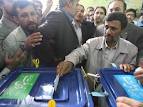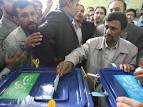
According to Reuters the authorities hailed the outcome as a resounding triumph for Iran�as it prepares for nuclear negotiations with the West.
Results announced by the Interior Ministry showed the United Principalist Front, closely linked with the supreme leader and critical of Ahmadinejad, leading Friday's vote, but with the hardline Resistance Front of the Islamic Revolution close behind.
The political outlook of these MPs, mostly elected in the provinces, is little known, but some may ally with the president because he backed their electoral campaigns, analysts say.
Guardian noted the Resistance Front also backs the supreme leader but some of its members have served under Ahmadinejad and still support him.
The conservatives had previously backed Ahmadinejad, but then turned against him after he was perceived to challenge the authority of senior clerics. His allies are likely to be ousted from key posts, and his economic policies challenged.
The Washington Post reported Ahmadinejad's opponents had already won an outright majority in the 290-member legislature in the first round of voting in March. Of 65 seats up for grabs in Friday's runoff election, Ahmadinejad's opponents won 41 while the president's supporters got only 13 seats. Independents won 11, according to the semi-official Mehr news agency Saturday.
The president�s supporters had their best showing in the capital Tehran. Ahmadinejad�s conservatives critics won 16 seats while his supporters nine.
Iran�s major reformist parties, who oppose both Ahmadinejad and the conservatives, mostly did not field candidates.
Haaretz quoted Associated Press as saying, while usually in agreement with the conservatives on foreign policy and many other issues, Ahmadinejad tried to change the rules of the political game in the Islamic Republic, where the president and legislature are subordinate to religious figures like the supreme leader Ayatollah Ali Khamenei.
Iran's media has claimed that the turnout Saturday matched that of the initial round of voting on March 2, when 64 percent of voters reportedly cast ballots.
"Mass turnout in runoff parliamentary elections," declared a front-page headline in the government-run Iran Daily.











